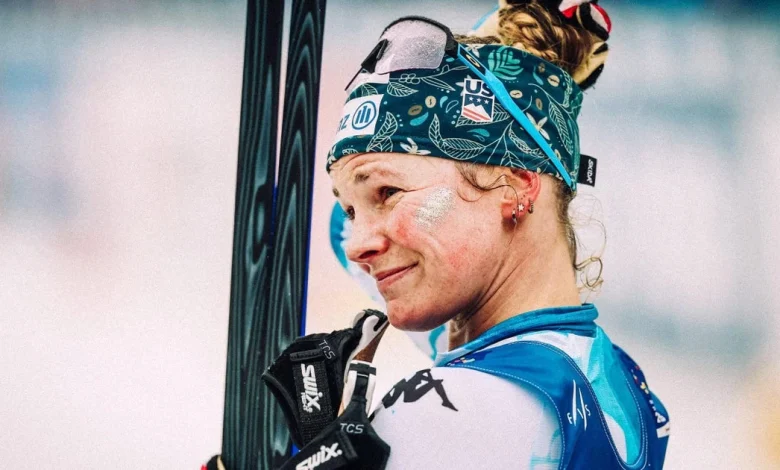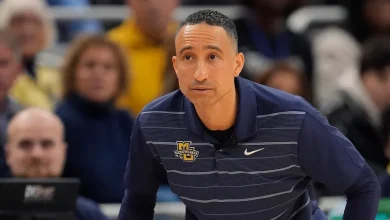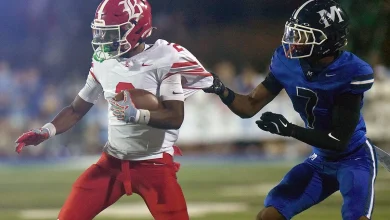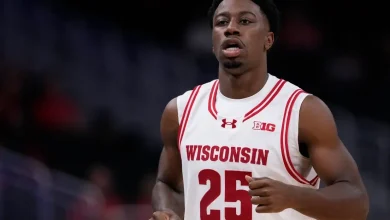Jessie Diggins, U.S. cross-country skiing star, to retire after season: Exclusive

Jessie Diggins can see the finish line.
The reigning overall World Cup cross-country skiing champion, the Olympic gold medalist, two-time world champion, the sort of Nordic skier America could once only dream of producing, is ready to take one last lap across the snow.
“I’m ready in my heart and my soul,” the 34-year-old Diggins said over a dinner in Vermont last month, speaking for the first time about her plan to retire at the end of this season, her 16th as a professional.
Well, almost ready. Diggins and the rest of the U.S. team are already in Europe preparing for the start of the World Cup season and the run-up to the 2026 Winter Olympics in February.
As Diggins pounded through lung-searing roller-ski training on the back roads of the Green Mountains this fall, she showed every intention of trying to go out on top, double-poling her way up hills as steep as an Alpine slope, her body springing down-and-up like a kangaroo, driving over each crest.
On breaks from the intervals, she smiled. She has almost always managed to find joy in the suffering.
That gift, combined with her world-class engine, her unique combination of fearlessness and vulnerability, and her willingness to tell the world about her frailties, is what has made Diggins an icon to plenty of people. She found as much glory and power in telling the world about her struggles with an eating disorder as she did in collapsing and sprawling in the snow after winning a race.
And the glory was there again on a wet and frigid morning in the Green Mountains in late October. The gray skies were spitting rain. The mercury struggled to crack 40 degrees.
“I just realized something,” she said, as she roller-skied her way up a long, winding incline. “This might be the last time I have to roller ski in 39-degree rain.”
In her early 20s, Diggins believed she would be one of those skiers who hang on until the bitter end. Nordic sports can be friendly to aging warriors. Marit Bjørgen of Norway won gold medals when she was nearly 38 at the 2018 Olympics. Ole Einar Bjørndalen, the great Norwegian biathlete, won a gold medal at 40 in Sochi in 2014.
In recent years, Diggins’ mind began to change. The missed holidays and birthdays piled up. In summer, she’d be up at her family’s cabin in Thunder Bay, Canada. Everyone else would be heading out paddleboarding. She’d be heading out alone on a long run. Then she’d watch them mixing sunset cocktails. How nice would it be to have a couple of those?
She also found herself increasingly obsessed with the absurd physical tests she put herself through each summer that have nothing to do with training for the upcoming season — long trail runs lasting roughly 40 miles that she indulges in everywhere from New England to Lake Tahoe.
They’re about the last thing she should be doing during the months when her body is supposed to be recovering from the grueling World Cup tour. There’s a reason she calls them her “big stupids.” They’re big and they’re pretty stupid — and yet, they’re part of the normalcy.
Diggins said she first began to contemplate the end roughly eight years ago, after that magical night in Pyeongchang at the 2018 Olympics, when she sprinted to the line and then had a mosh pit on the snow, celebrating the first U.S. cross-country medal in four decades. And it was a gold, in a team sprint, with Kikkan Randall, who had paved the way for Diggins to become Diggins.
Could it possibly get any better than that?
“HERE COMES DIGGINS!”
At the 2018 PyeongChang Olympics, Kikkan Randall and Jessie Diggins won @TeamUSA’s first-ever Olympic gold medal in cross-country skiing.#BestOfTheDecade pic.twitter.com/Y8ZgqzBLzx
— NBC Sports (@NBCSports) December 28, 2019
Also, Diggins’ life had changed. When Diggins started down the elite professional skiing path, she was basically a 20-year-old nomad, traveling the world for the first time. Bouncing from one exotic European locale to the next was about as good as it got.
That started to change at a friend’s wedding in 2015.
There were some ground rules for this reception. Instead of making the bride and groom kiss by tapping glasses, guests had to team up and remove wooden pieces from Jenga towers. If the couple removed pieces without collapsing the tower, the bride and groom kissed. If the tower collapsed, then the couple pulling the pieces had to kiss.
Midway through the reception, a former college hockey player named Wade Poplawski approached Diggins. He asked if she wanted to play some Jenga. Diggins figured, why not? As they began to play, another guy walked by and kicked one of the legs of the table holding up the tower. The tower tumbled.
The kiss led to a weekend visit, long runs through the trails of Vermont, and a relationship with a seemingly endless string of distance challenges.
Diggins lived and trained in Vermont, but only sort of, since she spent months away every summer at various training camps. Come November, she headed to Europe for four months. Poplawski worked in Boston in finance.
They plugged ahead. In 2020, they got engaged and got married two years later.
Diggins celebrates after winning the gold medal in the women’s sprint at the 2018 Pyeongchang Games. It was the Americans’ first Olympic cross-country medal in 42 years. (Lars Baron / Getty Images)
The last couple years, Diggins has found herself longing for home. Spending late fall and most of winter abroad gets tougher every year. She also wants to have a family.
“I’d be lying if I said that wasn’t part of the decision,” she said.
There have been other mothers on the World Cup tour, toting children around to all the stops for the Nordic white circus. She’s loved seeing it. She just doesn’t see herself doing that.
And she’s fine if becoming a mom is part of what costs her some years on the back end of an epic career. No, it’s not exactly fair. As Serena Williams pointed out, this is not a choice that male athletes have to face. But it’s not going to keep Diggins up at night.
And yet, she said, blaming the desire to start a family would be oversimplifying the matter.
Jessie Diggins’ Olympic medals
YearHostEventMedal
2018
Pyeongchang
Team sprint
Gold
2022
Beijing
30km freestyle
Silver
2022
Beijing
Individual sprint
Bronze
For Diggins, the peak moment of her career didn’t come at the Olympic Games either in 2018 or 2022, when she completed her medal set with a bronze in the individual sprint and then a silver in the 30-kilometer race. It didn’t involve clinching any of her World Cup titles. It didn’t even happen during a race.
It happened during a training lap ahead of her World Cup races in her home state of Minnesota in 2024. More than 20,000 of Diggins’ closest friends showed up and screamed their lungs out, creating an atmosphere that had the Scandinavians raving about the skiing culture that Diggins had played a major role in creating during the previous decade.
Diggins got on the podium that day, but it was the practice lap that got her. That’s when she could look up and take it all in and let all the love for her and her sport wash over her.
“I swear everything that has happened since then has just been icing on the cake,” she says.
Over and over, as Diggins stood at the start line in individual sprint races last season, some odd thoughts kept running through her brain. The individual sprints are elimination races, organized like a playoff-style bracket. Winning is less about time than it is about beating the people in your heat — the skier standing right next to you at the start line.
In race after race, as Diggins waited for the start signal, she wondered what she was doing there. She’d look over at her opponent. Often it was a friend. Did she really want to beat that person and make them feel bad?
That’s not how she used to approach those races. What happened? The answer was plain as day.
“I kind of lost my edge,” she said.
With a large crowd watching, Diggins competes in the 2024 World Cup event in her home state of Minnesota. “Icing on the cake,” she says of that weekend. (Federico Modica / NordicFocus / Getty Images)
She was all in on long individual races and team events. But when it came to the individual sprints, it wasn’t that she didn’t care, she just didn’t know exactly why she was standing there on the start line anymore. Yes, a good performance would deliver her World Cup points and allow her to compete for another overall title. But somehow that wasn’t enough — not when she weighed it against the life she was missing back home.
Even without her edge, Diggins still won the crystal globe that comes with winning the overall title. She still managed to finish as the best cross-country skier in the world.
When this was pointed out to her, she just shrugged and flashed an embarrassed smile. It’s about as close as Diggins comes to a flex.
There are alternatives to calling it a career. Maybe she could keep racing without competing in the individual sprints and just do the relays and the distances. She senses, though, that before long, the same quasi-apathy she felt before those short individual races would seep into the other competitions.
She didn’t want that to happen. Better to find a way to rediscover that edge, if only temporarily — like telling herself and the world this is it, one last lap through the World Cup circuit. It’s a season that just so happens to peak with the Olympic Games in Val di Fiemme in Italy, one of her favorite venues in the world.
If ever there was a day to scrap a workout, that 39-degree rain on a late October morning in Vermont might have been it.
Instead, Diggins was out there in her rain gear, mapping out the day’s torture session. It started with a series of eight-minute roller-ski intervals at an “easy pace.” That meant not pushing her heart rate above 172 beats per minute over the rolling terrain at the bottom of the mountain.
“I’m pretty diligent about my warm-up,” she said before heading off.
Off she zoomed up hills that might have had an amateur skier rolling backwards. As she skied, she pointed out the stream beside the road and recalled the brilliant orange-red leaves of just a few weeks before. This went on for about an hour.
Then came the stress part of the workout. That was three, six-minute intervals of 20 seconds of skiing as hard as she possibly could, followed by 40 seconds of recovery in motion. This all happened mostly up the sort of hills that a runner would walk up rather than wasting energy trying to scale with any decent pace.
Each interval left Diggins bent over at the waist, her eyes staring at her shins. Within a minute though, she would rise, her breath returning to something approaching normal. After five to seven minutes, it was time to push again — up terrain that got steeper with each segment.
She spent the past summer experimenting with heat training. That meant doing these sorts of workouts in windbreakers and long pants on sticky 90-degree days — then going directly into a sauna. The idea was to get her body used to pushing as her core temperature rose over 100 degrees, something that can happen on warm, sunny days in the Alps.
This is not how a skier prepares for a valedictory. It’s how someone prepares to ski through the finish line.
Two years ago, there were plenty of people telling Diggins that maybe the time to walk away had come. After believing she had moved past her battle with an eating disorder, Diggins relapsed.
That wasn’t how she wanted it to end. She wanted to finish on her own terms, not because she had succumbed to something. She accepted that her struggle was something she was going to have to work through for the rest of her life. She spent long hours in therapy and talking to the people closest to her about how she could compete and stay healthy. And then she got back to winning.
Now, it’s time to go out the way she wants to. She’s got plans. Those “big stupids” are going to become a big part of her life, because she knows she can’t live without testing her limits. Don’t be surprised to see her on the start line of 100-mile races. That should satisfy her competitive longings.
She wants to carve out more time for public speaking, telling her story and advocating for treatment and education about eating disorders and environmental sustainability. She’s more proud of the mental health policies she helped her federation adopt to support struggling athletes than she is of any race she won. That, she said, is her true legacy.
Diggins was crowned the overall World Cup season champion last season. She’ll vie for one last crystal globe — and Olympic medals — this winter. (EMMI KORHONEN / Lehtikuva / AFP via Getty Images)
She wants to commune with the next generation of skiers, the Nordic athletes she helped spawn, the girls who wouldn’t dare head to a start line without decorating their face with glitter like she does. She dreams of showing up at World Cup races next year and spending the weekend doing nothing but supporting the skiers who have been her teammates, working with the wax technicians, testing skis, and, of course, decorating their faces with glitter before they head out to the starts.
There’s one more season of racing to do before then. Another Olympic Games, and then, a final World Cup race weekend in Lake Placid, New York, in March that she wants to end in the ultimate celebration of her sport. If you’re planning on going, don’t forget to bring your skis.
Hopefully, after the racing ends, there’s going to be a little more skiing to do. The thousands expected to attend the races will be able to click in alongside her and ski the course. She’s even got a name for it — Jessie’s last lap.
“How cool will that be?” she says.
And then, the rest of her life, filled with big stupids and everything else, will begin.





